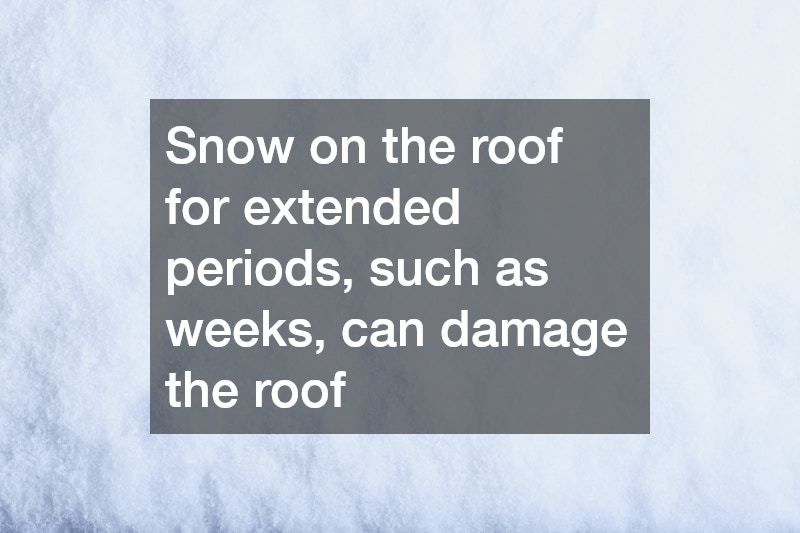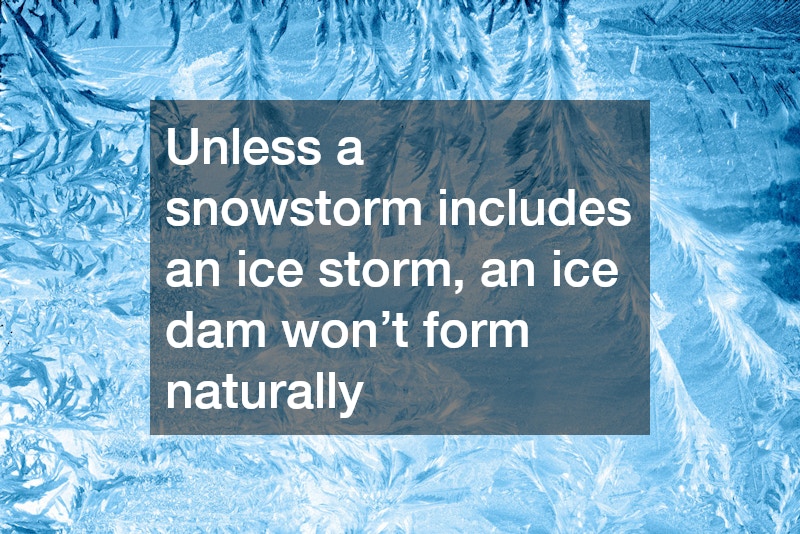
Winter snowfalls produce some of the most lovely scenes, but they can also damage a roof if ice dams form. Snow on the roof for extended periods, such as weeks, can damage the roof. Ice dam water damage can do the same. That’s why many roofing companies recommend the installation of ice dam prevention systems.

In most areas, a local professional roofer will offer the installation of these water prevention systems that can stop an ice dam roof leak from developing. They’ll examine your roof, its pitch, and the style of your home’s roof before designing a system for your roof. These winter water damage prevention systems differ in design because each home needs a different set of components to protect it. An installation on a flat roof would differ vastly from that of a steeply pitched gabled roof.
How Ice Dams Cause Damage
When snow accumulates on a roof, it won’t necessarily cause an ice dam, a thick ice bank on the roof’s edge with icicles dangling from it. Ice dams form when the temperature rises, melting snow, then drops again before the snow runs off the roof. Unless a snowstorm includes an ice storm, an ice dam won’t form naturally.

By ensuring that snow doesn’t accumulate for long periods on the roof, a homeowner prevents ice dams from forming on the roof. Ice dams add a lot of weight to a roof, and that weight can cause cave-ins, at worst, and minor leaks, at best.
People sometimes worry about water damage when they hear about local flood warnings. That said, lots of weather problems can cause water damage. If your house is hit with enough snow during a storm, it could absorb lots of water as the snow melts. You could need formal water damage restoration services even if your house was not technically flooded. Snow is just frozen water. It sometimes begins to melt when it’s affected by relatively low levels of heat.

Water damage consulting can be complicated in the winter. You’ll have to think about mitigation restoration as well. Mitigating a situation like that might be tricky since it could start to snow heavily again relatively quickly. If you research “what is a mitigation company?” you might find that specific organizations have some solutions in mind for this problem.
Still, if you’re trying to correct long-term water damage during a season where it’s snowing all the time, you could watch some of those efforts get undone. Water damage restoration can be time-consuming. It might begin snowing long before the relevant task is finished. Companies can help you prepare for new storms, which might help to slightly minimize this water damage cycle.
The summer might be coming to an end, but that doesn’t mean the risk of home water damage has gone with it. While summer rains can be a real nuisance for homeowners trying to avoid basement leaks and keep their homes dry, snow during the winter can cause just as much trouble. With freezing cold temperatures and heavy snow already being predicted for the coming winter, homeowners need to take some preventive steps if they want to avoid water damage during the cold winter months. Here are a few things homeowners can do to keep the snow from ruining their foundation and basement this winter:
-
- Interior Basement Waterproofing – Preparing the interior of a basement for the threat of water leaks is just as important as exterior preparations. There are a few interior waterproofing techniques that can help homeowners protect the inside of their homes from water that finds its way in. First, it is important to make sure basement sump pumps are working correctly. Simply unplug and replug the basement sump pump from the outlet to make sure that it kicks back in again. Second, apply a coat of waterproofing sealant to basement walls to prevent moisture and mold from building up on them. Finally, make sure to keep a slow stream of water running through pipes when temperatures drop below freezing. Frozen pipes can burst under pressure, causing major water damage throughout a home.

-
- Exterior Basement Waterproofing – Exterior waterproofing techniques are a homeowner’s first line of defense against the elements. Installing basement window well covers is a great way to prevent snow from accumulating around a foundation. When snow that has gathered in window wells starts to melt, it can leak into the basement and cause damage to a home’s foundation. It is also important to clear snow away from the foundation of the house. This is another way that melting snow can cause foundation damage and basement leaks.
- Waterproofing Inspection – Another great way for homeowners to make sure that their homes are ready to stand up to water damage this winter is to have a waterproofing company do an inspection. These experts can assess a home’s waterproofing systems, like a basement sump pump, French drain and gutters, to make sure things are working properly and are ready to go. If anything isn’t up to par, a waterproofing professional can advise you on the best way to fix the problem.
